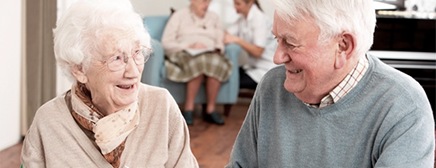How to Make Friends
When life changes dramatically, there are many things you may have to relearn. One of them is how to make new friends.
Before we consider how, let’s consider why.
If you have recently moved to a care centre, you may not know anyone else who lives there.
Your family and friends may live far away and be unable to visit regularly. (They may also be busy or unable to travel for various reasons.)
People are social creatures; we need one another. Interaction with others keeps your mind stimulated. Exercise for your mind is as important as exercise for your body—maybe even more so.
Conversation can turn to humorous things viagra online usa your grandchildren or great grandchildren have done. Laughter really is good medicine.
Those you befriend will also benefit from your newfound relationships. Though it can be discouraging when you can no longer do what you once did, you can still brighten someone else’s day and that’s a very good thing.
Let’s face it, you can’t have too many friends.
According to the Mayo Clinic, friendships . . .
• Increase your sense of belonging and purpose
• Boost your happiness and reduce your stress
• Improve your self-confidence and self-worth
• Help you cope with traumas, such as divorce, serious illness, job loss or the death of a loved one
• Encourage you to change or avoid unhealthy lifestyle habits, such as excessive drinking or lack of exercise
This and further information is available on the Internet at http://www.mayoclinic.org/healthy-living/adult-health/in-depth/friendships/art-20044860
How do you make friends?
Participate in planned activities and strike up a conversation with someone new. Even if these activities aren’t your first choice, give them a try if you’re able. You just might discover a new interest—and a new friend or two—in the process.
If you’re an extrovert overflowing with ideas, why not work with the staff to plan an activity that isn’t already on the schedule.
Eat meals in the dining room rather than your own room. If you have assigned seating, strike up a conversation and get to know the people at your table. If you can choose where to sit, try to make connections with a number of other residents.
Don’t simply migrate to the same table for each meal.
If you enjoy reading, why not start a book club with a few of the other residents?
Invite one or two friends back to your room to play cards, knit, or watch TV.
Do you like to paint? Draw? Take pictures? Ask around and see if one or more of the other residents would like to join you.
Find someone who spends a good deal of time alone and strike up a conversation. Maybe they’re shy and just waiting for someone to make friends with them.
It is of course fine to spend time on your own—introverts especially need to do so in order to recharge. Though it may seem awkward and uncomfortable at first, express appreciation to those who approach you. As you chat, you may realize you have lots in common and a new friendship is formed.
While interacting with your friends in person is important, that doesn’t mean you can’t stay in touch with people and make new friends online. Facebook, for example, can be overwhelming, but it is a great way to connect with others. Ask a friend or family member to help you set up an account and show you the basics. If there’s anything you don’t understand, ask for further instructions. You don’t want to set up an account that you never use.
The same is true of Skype, it’s an amazing way to stay in touch with family and friends—especially those at a distance. The video option is a great way to watch the grandbabies grow up when you can’t be with them.
Whether in person or online, the simplest way to make friends is to be friendly.
While it’s sad that anyone would have to issue a warning in an article about making friends, the truth is some people will try to take advantage of you. If someone does something or asks something of you that makes you uncomfortable, discuss it with a third party you know you can trust. Don’t let this warning deter you from making new friends; simply proceed with caution.



